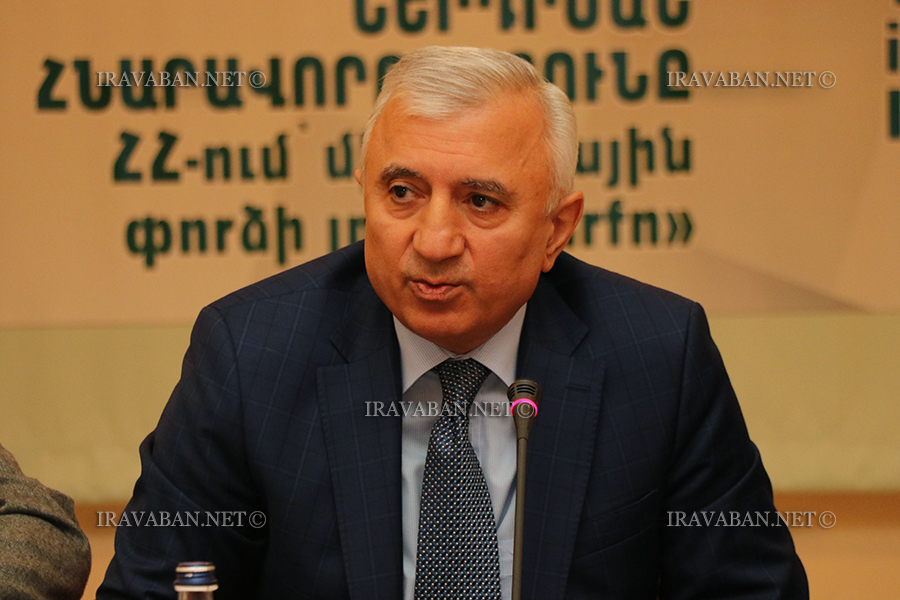The action plan stemming from the 2019-2023 Judicial and Legal Reform Strategy provided for the strengthening of the independence and impartiality of the judiciary since 2020․
Iravaban.net spoke on the topic with Gevorg Danielyan, former Chairman of the Supreme Judicial Council, former Minister of Justice.
– Mr. Danielyan , it is already 2022 , have you felt any change in the field ? How would you evaluate the work done or being done?
– First of all, the plan in itself was very flawed and vulnerable; it did not reflect the key systemic questions. I myself presented an extensive report at the Academic Council of YSU Faculty of Law, which was also attended by some representatives of the plan, but the suggestions were consistently ignored in the Government. By the way, the Scientific Council of the Faculty of Law regularly discusses the key legal issues crucial for the country, the results of which would only contribute to the real improvement of the entire legal system and, as a result, the authority of public authorities, but …
For example, we suggested that in the condition of widespread distrust towards former judges and law enforcement officials, at least initiating lustration should be a priority; emphasized the overtly politicized nature of the plan, including in terms of naked assessments; expected that strictly abstract and vague, and in some cases unnecessarily contradictory provisions would be removed from the plan; considered very important to create independent expert structures for drafting legal acts; to get rid of unconstitutional institutions in the stage of transitional justice, and so on. Finally, there was no reference to the unforgivable growth of crime and at the same time the sad state of disclosure, in connection with which we also presented concrete conclusions. It would be logical if these and other proposals were rejected on concrete grounds, but ignoring them is at least illegal and inappropriate behavior.
Formal public debates, unfortunately, tend to become a tradition. Of course, in such an atmosphere, there is not a single desire and mood to respond to both the drafts and the implementation of the already adopted laws, but we try not to completely remove these questions from our view, and the public authorities must finally find strength and at least partially abandon the isolationist and arbitrary way of working.
However, at this stage you are asking me about the implementation of a document that we initially had serious reservations about. I would like to add the following: the provisions of this document are not implemented even in their vulnerable initial form, as preference is given to solutions that are purely situational and, in my opinion, have obvious flaws with the constitution, that is, most of the drafts, which are openly aimed only at making the judiciary as controllable and manageable as possible, are hastily put into circulation. Contrary to Article 81 of the Constitution, even the practice of the competent international bodies is ignored, in particular, it is not possible to assess otherwise the initiative to establish so-called specialized judges to oversee pre-trial proceedings and de facto to apply special precautionary measures.
– It was also envisaged to improve the decision – making process of the Supreme Judicial Council , to ensure transparency and justification. What do you think, has this action been implemented? And if so; to what extent?
– I have already referred to the abstractness and lack of certainty of certain provisions. You are asking a very important, key question, but for an adequate solution, at least it was necessary to radically reconsider the whole structure and ideology of decision-making. Finally, it must be assumed that the official representing this constitutional body should not be supposedly protected from possible pressure and that the possibility of secret balloting should be considered as a guarantee. An official in a responsible position, yes, is obliged not only to vote transparently, but also to publicly reveal the validity of his position. And in the case of a collegial body, the justification can be realistic only if the possible versions of the justification are put to a vote in advance. Note that this is necessary in order to challenge the decisions of this body as realistically as possible, and not be limited to purely procedural aspects, and so on.
Meanwhile, we are currently witnessing completely different and at the same time contradictory developments, in one case the settlement of issues within its competence is unhindered by the National Assembly by laws; on the other hand, additional levers are initiated to discipline judges and interfere in the administration of justice in general. I think it should be taken as a starting point that it is inadmissible for the same structure to reserve and initiate proceedings at the same time, regardless of what name it is presented to us, and the right to conduct an investigation. Let’s hope that these trends will not continue.
– Strategic actions also included strengthening the independence and impartiality of the judiciary, improving the public accountability of the judiciary, and having a judiciary free of corruption and patronage. How would you rate this item? Is the judiciary independent and impartial ?
– I think some judges prefer to remain close to their constitutional title and show a dignified attitude, our deep gratitude to them, but there is no visible reason to even hint about an independent and impartial judiciary. I will end the answer to this question only with the observation that no official has the right to express his own views, including his opinion on the degree of trust in judges and to naively think that he is not undermining by that the independence of the judiciary. The power to determine the components of trust in the judiciary can only be exercised through the results of sociological opinion polls conducted by independent experts formed in accordance with international legal standards, whereas and the public discourse of officials is a classic example of unlawful conduct.
– Does Armenia currently have a judicial system free from corruption and patronage ? What work do you think is being done or should be done in this direction?
-Since in recent years no competent and comprehensive research has been carried out by any competent independent expert body, I will refrain from even expressing an opinion, it will be unforgivably subjective. I am aware that monitoring work is underway, let’s wait for the results. And the assessments of the representatives of the political authorities, as I noticed, not only have serious appeals to the elementary legitimacy, but also do not inspire any belief. We see that judges are being accused on various platforms, including the parliament, of violating political restraint and neutrality, while the same authorities are not even concerned that any legal act has not given at least a rough definition of “political activity”, leaving it to the taste of the connoisseurs.
And there are real tools to improve the judiciary, they are very necessary to finally prevent the especially unpleasant phenomenon of persecution of disobedient judges; where the judges and prosecutors have nothing to do with the firms carrying out advocacy activity; exclude incomprehensible differentiated approach to judges, and so on.
The public authorities have always sought to control the judiciary, there is just a real need of organizational tools to control that appetite, which in addition to being invisible, also acquires new shades.


















